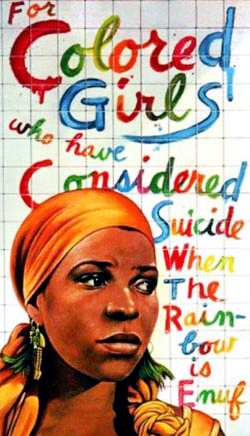‘Colored Girls’ brings injustices to light

 Somehow the better, alternative version of Netflix has been right under my nose and I didn’t even notice it. It’s called Films on Demand and it’s free. You’ve surely discovered it, but allow me to nerd out over excitement real quick.
Somehow the better, alternative version of Netflix has been right under my nose and I didn’t even notice it. It’s called Films on Demand and it’s free. You’ve surely discovered it, but allow me to nerd out over excitement real quick.
I made a Films On Demand account quickly through a link on the Library website once I discovered the free site.
I let out an actual mouse-like squeak when I saw Broadway Digital Archives as one of Films On Demands featured producers.
I have a distinct memory of a hot summer night when my fan had broken, and I began to prowl the house looking for any distraction from the heat.
I found it during a lazy drag through the channels of midnight analog television, between the women who are always a phone call away and the priest who knows his audience’s late night guilt only too well.
It was Broadway Digital Archives on PBS screening “For Colored Girls Who Have Considered Suicide When the Rainbow is Enuf.” At the time I must have been around 14. Watching the original “For Colored Girls” choreopoem, written by poet and actress in the film Ntozake Shange, was like a veil being lifted before my eyes.
I wept for the women who were so raw and full of emotion, whose anger and loss and burden rolled down my cheeks for the first time.
I realized, like many black American women have, that there is no representation of black women like this in pop culture or mass media. Instead, they are relegated to endless stereotypical roles. The strong black woman. The loud black woman. The angry black woman.
You have seen the roles.
A thousand tears fell down my face for the women who had to hold them back, relegated to the superhuman role that serves to dehumanize them and ignore their struggle with realities.
“Oh, all of these bones shattered like soft ice cream cones.”
This was supposed to be a review about Films on Demand, but instead I think “For Colored Girls” and what it represents is more important.
Please, watch “For Colored Girls Who Have Considered Suicide When The Rainbow Is Enuf,” and listen to the actual feelings and lives of black women. Listen to them. Do not assume you know what you will hear.